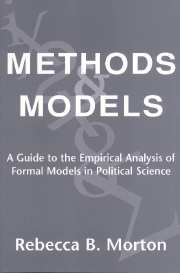Book contents
- Frontmatter
- Contents
- Acknowledgments
- I Introduction
- II Formal Models in Political Science
- III Empirical Evaluation of Formal Models
- 4 Fundamentals of Empirical Evaluation
- 5 Evaluating Assumptions
- 6 Evaluating Predictions: Equilibria, Disequilibria, and Multiequilibria
- 7 Evaluating Relationship Predictions
- 8 Evaluating Alternative Models
- IV A Second Revolution
- References
- Name Index
- Subject Index
7 - Evaluating Relationship Predictions
Published online by Cambridge University Press: 10 December 2009
- Frontmatter
- Contents
- Acknowledgments
- I Introduction
- II Formal Models in Political Science
- III Empirical Evaluation of Formal Models
- 4 Fundamentals of Empirical Evaluation
- 5 Evaluating Assumptions
- 6 Evaluating Predictions: Equilibria, Disequilibria, and Multiequilibria
- 7 Evaluating Relationship Predictions
- 8 Evaluating Alternative Models
- IV A Second Revolution
- References
- Name Index
- Subject Index
Summary
In Chapter 6 I discussed the difficulties of evaluating equilibrium predictions. Nevertheless, evaluating these predictions is a useful and important step in overall model evaluation, just as analysis of the model's assumptions is vital. However, most of political science is focused on understanding the relationships between variables. Empirically oriented political scientists often approach a research paper with the question: “What is the dependent variable? What is this paper trying to explain?” The implication is that knowledge of the dependent variable implies discovering the independent variables (explanatory or causal factors) on which the dependent variable depends. Formal modelers are interested in the same question; they, too, wish to discover relationships. Relationship predictions are generally of two types: either they predict relationships between variables at one moment in time in equilibrium (comparative static predictions) or they predict relationships between variables over time or between time and a variable (dynamic path or process predictions). Relationship predictions may also be a combination of the two. This chapter presents examples of each type.
I also illustrate two other important uses of these empirical evaluations: to increase our understanding (1) of empirical cases beyond the focus of the original theory and (2) of the implications of proposed policy changes. Researchers often have different perspectives on the applicability of their models across data sets. That is, sometimes a researcher is interested generally in how members of Congress vote, but uses a particular type of vote (such as Supreme Court nominations) in her empirical analysis.
- Type
- Chapter
- Information
- Methods and ModelsA Guide to the Empirical Analysis of Formal Models in Political Science, pp. 209 - 241Publisher: Cambridge University PressPrint publication year: 1999



